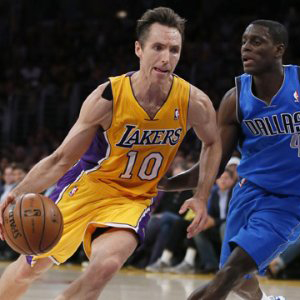 After Friday’s dispiriting home loss to the Washington Wizards, Los Angeles Lakers coach Mike D’Antoni could not take it any longer.
After Friday’s dispiriting home loss to the Washington Wizards, Los Angeles Lakers coach Mike D’Antoni could not take it any longer.
D’Antoni went on a wide-ranging rant against his team, targeting its lack of commitment and effort on both sides of the ball. He said the Lakers were “messing with the basketball gods” and called their championship aspirations “laughable.”
Although D’Antoni mentioned no one by name, very few wearing the forum blue and gold appeared exempt.
The coach cited those who “go one-on-one every time,” which translates to Kobe Bryant and Metta World Peace. He lamented those who don’t commit to “what we’re doing defensively and honing in and doing it,” which translates to Steve Nash, Dwight Howard and Antawn Jamison.
And just in case anyone felt like they were doing all they could to help the Lakers win, D’Antoni questioned the overall focus, saying “nobody understands the importance of every possession offensively and defensively.”
You know who was exempt from D’Antoni’s diatribe? Mike D’Antoni.
And that doesn’t seem right, because a lot of these problems have existed everywhere D’Antoni has coached.
1. D’Antoni complains about the Lakers not moving the ball. But he is the architect of the “seven seconds or less” offense, which isn’t a hell of a lot of time to ask the opponent to sustain its defense.
The Lakers are sixth in scoring at 102.1 points per game. While that is not bad by any stretch, a team coached by D’Antoni over a full season has never finished lower than third, including the 2010-11 New York Knicks.
2. Despite having his personal maestro in Nash at the controls of his offense, the Lakers are a pedestrian 17th in the NBA in assists per game. With Nash running D’Antoni’s offense in Phoenix, the Suns led in assists three times and finished third once. Even with Raymond Felton and Chauncey Billups passing to ball-stoppers Amar’e Stoudemire and Carmelo Anthony in New York, the Knicks were 15th.
And you have to go back to the previous century to find a time when Nash averaged less than his current 6.8 assists. A year ago in Phoenix, in nearly two less minutes per game with Jared Dudley as his shooting guard and Marcin Gortat as his center, he averaged 10.7 assists. 
Nash’s diminished dominance of the ball also has the Lakers 24th in turnovers with 15.1 per game. They are 21st in assist-to-turnover ratio at 1.46 and 29th in turnover differential – only Orlando is worse – at minus-1.9.
3. The Lakers continue to rely heavily on the 3-pointer, even though they are not a great shooting team. They are third with 24.6 attempts but just 13th with a percentage of .360.
In D’Antoni’s five full seasons as coach, his teams have always been in the top five in arc hoists. But the Suns led the league in percentage four times, and even the Knicks were eighth.
Individually, Nash is seventh at .434. The next-best Laker is supposed sharpshooter Jodie Meeks, who is 66th at .372. World Peace is eighth in attempts with 395 and 99th in percentage at .347. Bryant is 19th in attempts with 350 and 105th in percentage at .340.
I thought this was a site for more intelligent basketball readers: Why are you using total points per game to illustrate D’antoni’s defensive woes instead of points per 100 possessions or any more illuminating metric, and why do you not acknowledge that perhaps Nash’s woes have much to do with the fact that Kobe is the prime ballhandler for LA?
This seems a hastily written post with poor backing information (advanced analytics? Points per game barely counts as any kind of analytic) in chase of some personal vendetta, not anything that actually is insightful. (And this coming from someone who generally dislikes the Lakers and D’antoni).
Seconded. Although I do hate “advanced” analytics.
Why do you hate them, out of general curiosity?
I dislike improper usage or the usage of it above all else, but do believe proper usage of it can enlighten fans and help teams.
Let’s take PER for example. I know a lot of people who hate the way it seems to be the most popular advanced metric and tries to do the most by placing a numerical value on a player’s overall performance. My question to those who dislike it, though, is how is PER any different than looking at two players’ traditional box score line and judging which had ge better game? I don’t believe it’s any different at all, only better because it takes more background and context on each stat, better than any one mind could on its own in a second. So if we would compare players based in some part on their numbers, and w agree being well rounded is a good trait, what is wrong with a standardized formula instead of us making general guesses?
Raymond Felton didn’t play with Carmelo Anthony until this past year. The two never played together under D’Antoni.
Thanks, James. Fixed.